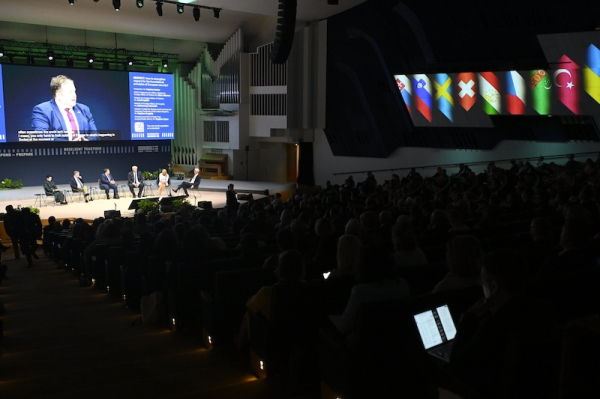Helsinki diplomacy summit opens with divided voices on peace and war

The conference marks the 50th anniversary of the Helsinki Final Act. Photo: Mikko Stig / Lehtikuva
- Previous Article Thunderstorms set to strike southern and central Finland
- Next Article Finland increases foreigner removals by over 30 percent in first half of 2025
The Etyk+50 conference in Helsinki opened on Thursday at Finlandia Hall, marking the 50th anniversary of the landmark 1975 Conference on Security and Cooperation in Europe (CSCE). While the original meeting was attended by heads of state from the Cold War’s rival powers, this year’s gathering featured lower-level representation from both Russia and the United States.
President Alexander Stubb of Finland, President Volodymyr Zelenskyy of Ukraine and United Nations Secretary-General António Guterres delivered the main addresses in the morning session. Their speeches underscored widely differing priorities and perspectives among participants.
Stubb addressed the audience in person, warning against selective internationalism and calling for the protection of rules-based order globally, not only in Europe. He also acknowledged the suffering in Gaza alongside the war in Ukraine.
Zelenskyy joined via video link and offered a blunt assessment of Russia’s ongoing war. “Again last night, Russian drones targeted our soldiers and civilians,” he said. He spoke of mass suffering, repeated his call for increased sanctions and emphasised unity between Europe and the United States. Zelenskyy stated that former U.S. president Donald Trump “wants peace” but stressed that decisive joint action is still needed.
The contrast between Zelenskyy’s wartime urgency and Guterres’s formal language was noted in several Finnish media outlets. Guterres, speaking in a pre-recorded message, focused on upholding the UN Charter and the Helsinki Final Act principles, calling for renewed dialogue and multilateralism. He did not address the war in Ukraine directly.
A more grounded intervention came from Urho Kekkonen, the Finnish president who hosted the original CSCE in 1975. Though long deceased, his quote from that time was revisited during the event: “Recognising existing facts does not mean submitting to the weaknesses of the present.” Finnish media described the present tone in the room as one of strained optimism, with acknowledgement that the “spirit of Helsinki” remains under pressure.
The day’s events included a panel on European security, featuring Finnish Foreign Minister Elina Valtonen, Ukraine’s Deputy Foreign Minister Andrii Sybiha, Mongolia’s Foreign Minister Batmunkh Battsetseg, UK Minister for Europe Stephen Doughty and journalist Stephen Capus of Radio Free Europe/Radio Liberty.
Valtonen questioned the viability of consensus decision-making within the Organisation for Security and Co-operation in Europe (OSCE), saying that consensus “barely works anymore”. Sybiha argued that countries with aggressive actions should not hold veto power. He added that “every part of our country is irreplaceable,” reinforcing Ukraine’s territorial claims.
Battsetseg described how Mongolia’s OSCE membership had improved women’s rights and human rights initiatives, providing a bridge to Europe. Doughty highlighted the UK’s commitment to European security frameworks. Capus reflected on the role of media in upholding transparency.
In side events, Belarusian opposition leader Sviatlana Tsikhanouskaya, now in exile, made an appearance. She had spoken earlier in the day about repression in her country but did not receive a main speaking slot. Her team expressed disappointment that Belarus received little focus in the official programme.
International human rights expert Federico Borello from Human Rights Watch concluded the first session with criticism of Finland’s withdrawal from the Ottawa Treaty banning anti-personnel mines. He warned that the move increases risks to civilians and urged reconsideration.
The conference theme focused on civil society’s role in maintaining Helsinki’s original commitments: peace, sovereignty, and human rights. Participants repeatedly referenced the impact of the 1975 agreement, which included human rights clauses that many historians credit with pressuring authoritarian regimes in the Eastern Bloc.
Despite the historical context, current tensions in Ukraine and Gaza dominated the discourse. Russia’s presence at the event was minimal and confined to lower-level diplomatic figures. The United States also opted not to send a high-ranking official.
The remainder of the day’s programme included further panel discussions and side events, continuing until the evening.
HT
- Previous Article Thunderstorms set to strike southern and central Finland
- Next Article Finland increases foreigner removals by over 30 percent in first half of 2025
Source: www.helsinkitimes.fi
